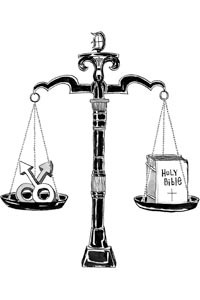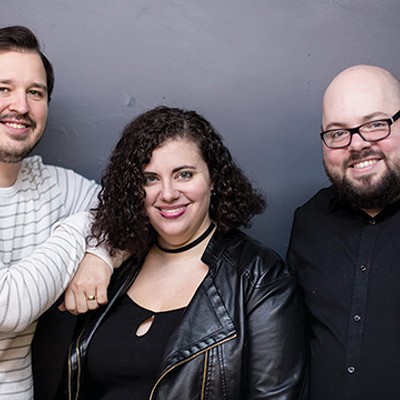Duquesne University has been the subject of some undesired attention in recent years, mostly related to its policies on sexual freedoms. Last year, for example, the school famously forced WDUQ-FM, the NPR affiliate it operates, to reject sponsorship from Planned Parenthood. And the Catholic institution still isn't the easiest place for lesbian, gay, bisexual, or transgender (LGBT) individuals to work or study. But the school has also at least tried to make that community feel more accepted.
In 2005, despite harsh criticism from some students and faculty, the school allowed the formation of a campus Gay-Straight Alliance. Additionally, Duquesne officials have moved to prohibit discrimination on the basis of sexual orientation -- though activists say the school could go further.
"You should feel accepted on your campus," says Gay-Straight Alliance member Rachel Noderer. "You should have that regardless of whether or not your lifestyle is considered a sin."
Duquesne's decision to recognize the alliance in 2005 sparked controversy, with some students contending that the group's values would conflict with those of the Catholic university's. ("The goal of this proposed immoral alliance is the endorsement of a homosexual lifestyle," wrote one student in a 2005 letter to the campus newspaper.)
But despite the animosity, the Alliance took up a cause: persuading administrators to change its nondiscrimination policy. According to Noderer, Alliance leaders met with university officials last fall to discuss a change in the policy. At the time, school policy prohibited "discrimination or harassment on the basis of race, color, religion, national origin, sex, age, disability or status as a veteran." Missing from that list, activists complained, were the words "sexual orientation," and the Alliance wanted Duquesne officials to make it perfectly clear that discrimination on the basis of sexual orientation would not be tolerated.
At first, prospects for a change looked dim. Jon Baker, who has been the Alliance's president since the group's inception, said that the message he got from administrators was that a change to the nondiscrimination policy "was not going to happen."
But in fact, it did. In an e-mail to City Paper, Karen Ferrick-Roman, the university's assistant director of media relations, stated that Duquesne updated the policy "several months ago." The school now bars discrimination on the basis of sexual orientation.
"While [the policy] update was not specifically in response to the students' request," Ferrick-Roman adds, "the students' request was noted while the policy was being discussed."
News of the policy change comes as a surprise to Alliance members. "It's really exciting" that the university decided to amend the policy's wording, Noderer says, "But I wish [the Gay-Straight Alliance] would have been told."
Others wish that Duquesne took what they see as the next logical step: offering LGBT employees domestic-partner benefits, which other institutions offer to couples in committed but unmarried relationships.
Schools like the University of Pittsburgh offer health and life insurance, as well as educational benefits, for employees involved in same-sex relationships. But of course Pitt doesn't answer to the Catholic Church; Duquesne does.
Asked about the possibility that the school might give ground on this issue too, Ferrick-Roman cited another portion of the administrative policy: "Duquesne University ... is an educational institution operated in affiliation with the Roman Catholic Church. Nothing in this Policy should be construed as a waiver either of ... rights which Duquesne University enjoys as a religiously-affiliated organization."
Students recognize that prohibiting discrimination is one thing, but asking the school to go against staunch Catholic teaching on marriage is something else. "It's tough," says Baker. Given the Catholic position on marriage, sanctioning domestic partnerships would be "a serious conflict of interest for the university. The repercussions would be extreme."
Even so, Noderer says, "It's very frustrating." And the change to the non-discrimination policy makes the school's refusal to offer benefits tenuous. While the school took a "big step" by barring discrimination, she says, refusing to offer same-sex benefits to employees "is a little hypocritical. ... I definitely feel that that's discriminatory."


















